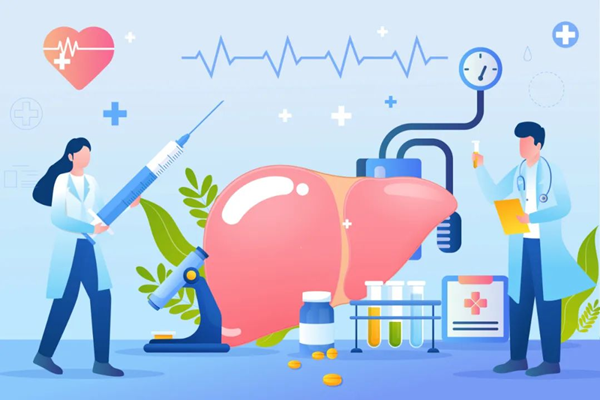How to prevent liver cancer
Liver cancer is terrifying not only because it's difficult to cure, but also because about 70 percent of patients are diagnosed at the intermediate or late stage of the disease and have already missed the best treatment window. How can we prevent liver cancer? What kind of treatment can we have?
Lang Ren, chief physician of hepatobiliary surgery of Beijing Chaoyang Hospital Affiliated to Capital Medical University, was invited to address public concerns about the prevention and treatment of liver cancer.

How much do you know about liver cancer?
What causes liver cancer?
Professor Lang Ren: Liver cancer is caused by multiple factors. Common factors include chronic viral hepatitis (mainly hepatitis B and hepatitis C), liver cirrhosis, long-term excessive drinking, and eating mildewed or pickled food. In recent years, liver cancer caused by non-alcoholic steatohepatitis (commonly known as fatty liver) has seen rapid increase.
What are the early symptoms of liver cancer?
Professor Lang Ren: The early stage of liver cancer shows very atypical even no symptoms. The common sign is a remarkable increase of serum levels of alpha-fetoprotein. Half of liver cancer patients have obvious hepatalgia because the growing tumors in their liver lead to a passive stretching of the hepatic envelope. At this time, the patient may no longer be in the early stage of liver cancer.
How to prevent liver cancer?
Why is regular screening crucial for staying away from liver cancer?
Professor Lang Ren: For patients who have been infected with the hepatitis virus, regular review is conducive to tracing the development of the condition so that doctors can provide targeted treatment. People who have hepatitis B, liver cirrhosis and a family history of liver cancer are advised to undergo abdominal ultrasonography and serum alpha-fetoprotein (AFP) detection every six months.
What are effective ways to prevent liver cancer?
Professor Lang Ren: Hepatitis B vaccination. HBV (hepatitis B virus) infection is the main cause of primary carcinoma of the liver. Hepatitis B vaccination is the best way to prevent HBV infection.
Quit drinking. Alcohol produces toxic reactions in the process of liver metabolism, which can affect the liver’s function and damage hepatic cells or cause irreversible damage to hepatocytes, which can lead to liver cirrhosis, and even cancer.
Adjust eating habits. Most of the damage to the liver is a chronic process caused by unhealthy habits such as eating pickled, high fat and high cholesterol food or food containing aspergillus flavus. Taking medicines for a long time, especially some folk prescription, may also cause damage to the liver.
What are the methods of treating liver cancer?
Why do the treatment methods vary?
Professor Lang Ren: With the continuous advancement of medical technologies, there are many effective ways to treat liver cancer. The main treatment methods are as follows:
Surgical operation, including removal of the tumor and liver transplantation, is the most thorough treatment method.
Radiofrequency ablation is burning the tumor to death or freezing it to death.
TACE is a method of blocking the blood supply to the tumor, making the tumor lose its nutrient source for growth and applying medicine to it.
Radiotherapy is local application of radioactive particles to kill the tumor.
The whole-body systematical treatment, namely targeted therapy and immunization therapy. Although there are many methods to treat liver cancer, every method has its restriction. Therefore, the treatment choice should be made based on the development stage of liver cancer, the physical condition of the patient and the liver function.
What kind of liver cancer patients can have surgery?
Professor Lang Ren: Liver cancer that has not invaded important blood vessels can be directly treated by surgical removal. Liver cancer that has major vascular invasion and advanced liver cancer cannot be removed by radical surgery. Before surgery, the patient’s physical condition and the function of the remainder of their liver should be considered.
What is the principle of liver resection?
Professor Lang Ren: The liver resection should follow two principles: thoroughness and safety. 1. The thoroughness of resection is to remove the tumor completely. The safety of surgery means that the surgery should be carried out in a way that ensures the safety of the patient. After the tumor is completely removed, the remaining liver should be able to meet the normal physiological needs of the patient.
What is the long-term prognosis for liver cancer patients?
Professor Lang Ren: The prognosis of liver cancer patients depends on the timing of the detection and treatment. Patients at the early stage, especially with a tumor less than 2 centimeters in diameter, can reach a longer survival after surgery. If the tumor is larger than 5 cm in diameter, it may be hard to achieve a satisfactory survival level.
For patients with minor liver cancer or liver cirrhosis, liver transplantation is better than liver resection. The five-year survival rate can reach about 70 percent.
What is liver transplantation surgery?
Professor Lang Ren: Liver transplantation is a surgery that removes the diseased liver and transplants a healthy liver into the patient. It is used to treat end-stage liver failure or early-stage liver cancer.
What are the precautions for patients after liver transplantation?
Professor Lang Ren: After liver transplantation, the patient should take long-term and regular anti-rejection medicine and avoid tobacco and alcohol. They should also regularly review the liver function and medicine levels and undergo liver ultrasounds so that their medication plan can be adjusted according to examination results.
In addition, a patient who has had liver transplantation should pay attention to infection prevention in daily life and keep a healthy and regular life style.
Links
>
Copyright© Chinese Center for Disease Control and Prevention. All rights reserved.
京ICP备11024750号-1 京公网安备11011402013004号
京ICP备11024750号-1 京公网安备11011402013004号






